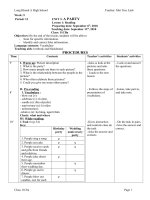Unit 3 becoming independent lesson 3 reading
Bạn đang xem bản rút gọn của tài liệu. Xem và tải ngay bản đầy đủ của tài liệu tại đây (1.07 MB, 33 trang )
Unit 3:
BECOMING
INDEPENDENT
Lesson 3: Reading
Time-management skills
I. Pre-reading
1.
Vocabulary
Strive /straɪv/ (v)
Cố gắng
Mobile device
Thiết bị di động
/ˌməʊ.baɪl dɪˈvaɪs/
Eg: The winter is approaching
Approach /əˈproʊtʃ/ (v)
Đến gần, tiếp cận
Prioritise /praɪˈɒr.ə.taɪz/ (v)
Dành ưu tiên
Self-esteem
Sự tự tôn, tự trọng
/ˌself.ɪˈstiːm/ (n)
Eg: With good time-management
skills, you can build your selfesteem
Be at a loss
/bɪ ət ə lɒs/
Lúng túng, bối rối
Cố gắng
Strive /straɪv/
Mobile device/ˌməʊ.baɪl dɪ Thiết bị di động
ˈvaɪs/
Đến gần, tiếp cận
Approach /əˈproʊtʃ/
Dành ưu tiên
Prioritise /praɪˈɒr.ə.taɪz/
Sự tự tôn, tự trọng
Self-esteem /ˌself.ɪˈstiːm/
Lúng túng, bối rối
Be at a loss /bɪ ət ə lɒs/
2. Game:
LABELING
Strive
Thiết bị di động
Đến gần, tiếp cận
Prioritise
Sự tự tôn, tự trọng
Be at a loss
Strive
Mobile device
Approach
Prioritise
Self-esteem
Be at a loss
Cố gắng
Thiết bị di động
Đến gần, tiếp cận
Dành ưu tiên
Sự tự tôn, tự trọng
Lúng tung, bối rối
II. While reading
Being independent is being able to take care of yourself, and not
having to rely on anyone else. That is what many young people strive for.
However, the ability to live independently does not develop naturally: you
need a number of life skills to stop relying on your parents and older siblings.
Among those skills, time management is probably the most important one.
With good time-management skills, you can build your confidence and selfesteem. These skills will also help you to perform your daily tasks, including
your responsibilities at school and at home. If you can use your time wisely,
you will not feel very stressed when exam dates are approaching. You can act
more independently and responsibly, get better grades at school and have
more
time
for
your
family
and
friends.
Time-management skills are not difficult to develop. First, make plans
for the things you need to do on a planner or an app on your mobile device.
Organise them in a schedule so that they can be checked later. Figure out
how much time you will need for each of the things, and then put time limits
on them. Second, prioritise your activities. If you have so much to do in a day
or a week, you may be at a loss as to how to fit everything in. So decide what
is important to you and give it the most of your time or add it to the top of
Task 1
Read the text and select the
statement that express its main
idea
A.You need important life skills to become
independent.
B.Good time-management skills help you to
build your confidence and self-esteem.
C.Time-management skills are not difficult to
develop.
D.Mastering time-management skills has
many benefits and there are three steps to
develop them.
Task 2
Answer the following questions
1. What are the benefits of having good
time-management skills?
2. How can you make plans for the things
you need to do?
3. Why should you schedule the things
you need to do?
4. How can you prioritise your activities?
5. Why should you develop routines?
GAME
LUCKY STR
1
2
3
4
5
6
7
8
5. Why should you develop routines?
A. Once routines are developed, they need more time
to do
B. Once routines are developed, they take less time
to do
C. Once routines are developed, they are free
1. What are the benefits of having
good time- management skills?
A. You don’t feel stressed when exam dates are
approaching
B. You can act more independently and responsibly, get
better grades at school and have more time for family
and friend
C. Both A and B are right
How can you prioritise your activities?
A. Decide what is important to me and give it the
most of my time or add it to the top of my list
B. Decide what is important to me and give it less
time to do
C. Give most of time to do









